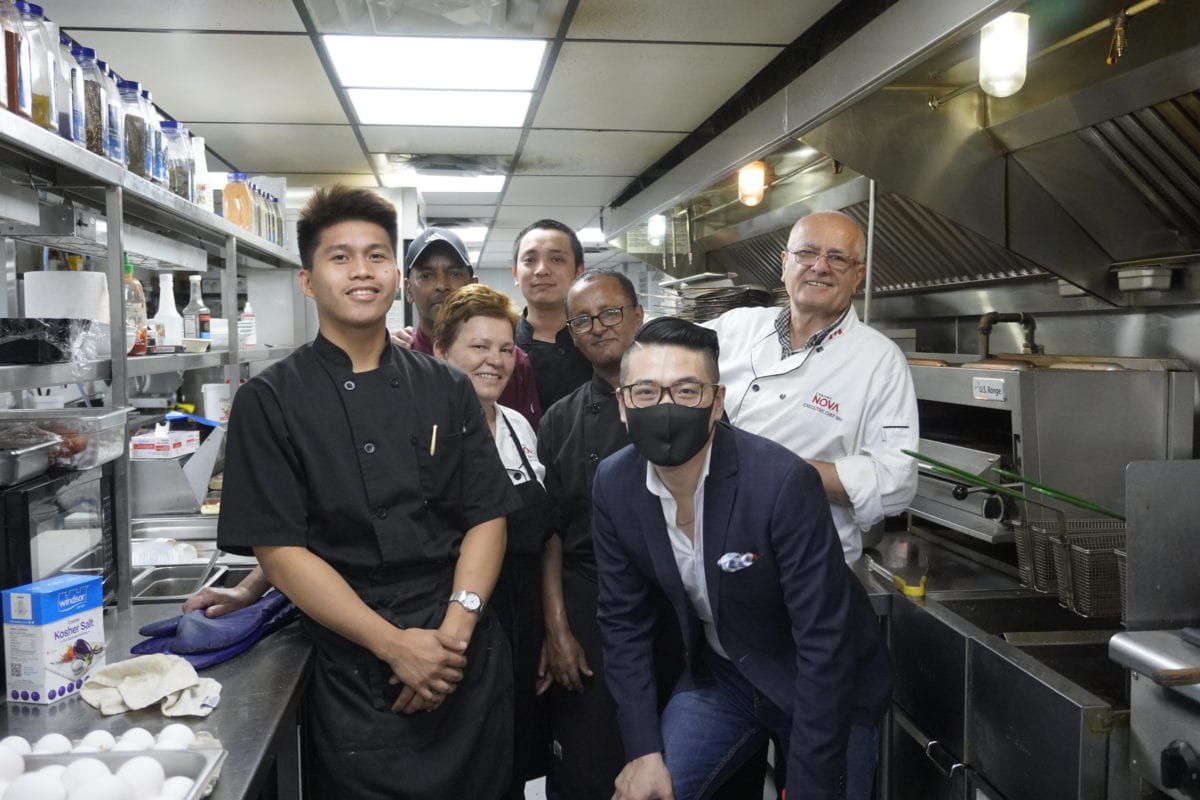Business schools might someday use the experience of Sam Yang as a case study in general managers leading an enterprise in troubled times.
Three days after he took the reins as general manager of the Chateau Nova Hotel and its Quarry Restaurant and Lounge on March 16, he had to lay staff off due to the pandemic.
“It was unprecedented. Looking back I can’t believe how things progressed. It was a game changing moment,” he said.

Before Covid, the Quarry was serving between 150 and 200 customers per day but within days business activity plummeted by 95 per cent.
Out of his regular food and beverage staff of 70 people who worked in the restaurant, banquet services, kitchen, bar and lounge he laid off all but three: the executive chef, staff coordinator and one server.
“That was pretty hard. Letting our (staff) go. We wouldn’t be able to support them. And working with minimal staffing. That was very hard,” Yang said.
With no conferences happening in Yellowknife, nor large groups of travellers coming in, banquets dried up overnight, cutting out one of the most lucrative sources of revenue for the restaurant.
“That part of the business was gone from the equation. It normally would contribute between 50 to 60 per cent of our food and beverage revenue,” Yang said.
During the long, slow months of April until July, the hotel and restaurant got by with the federal government’s wage subsidy, layoff extension and mortgage deferral programs that helped “keep the doors open.”
There was little activity in the hotel and restaurant other than guests self-isolating, for whom the Quarry prepared hot meals and brought to their rooms. The restaurant’s only source of income was some takeout meals.
“I found it really hard to survive with that much revenue. I can give you some some numbers just from the top of my head: From March 19 to April 17 our restaurant did take out orders of $500. How can $500 a month pay the utilities, chef’s salary, my salary, the council tax, the property tax or the insurance?”
That figure is dwarfed by the Quarry’s normal monthly average sales of $50,000 to $70,000.
Things improved when the restaurant reopened on July 3 under the relaxed restrictions of phase two that began a few weeks before that.
Yellowknifers responded with “overwhelming reaction” to reopening and “just wanted to eat out again,” Yang said.
“There was a lot of curiosity, a lot of drive from the local community, wanting to use our facility. And in July we had some hot days so people came in and took advantage of the hot weather on the patio, especially over the weekend. It was great to see that our regular patrons came back. And we have been fairly busy since then.”
However, operations aren’t yet back to normal, and Yang finds himself spending more money on overheads, namely cleaning expenses for a restaurant with a hugely reduced capacity.
The upper and lower levels of the Quarry have capacity for 120 diners and 50 on the patio. But phase two rules for indoor gatherings require a limit of 25 indoors.
“You do see the empty space. And because of that, we also have to turn people away, just because we already reached 25 people. Sometimes it’s heartbreaking to turn the local diners away,” Yang said.
“We have to turn some business away, or from the group bookings in the restaurant like birthday parties or engagement parties due to the party size. But that’s the new environment we have to operate in.”
One year ago the restaurant spent about $2,000 each month on cleaning costs. It’s now spending $6,000 per month on the enhanced cleaning procedures required under Covid rules.
“The same time last year, we were doing triple the amount of the revenue for food and beverage. Now we’re only doing one-third of that revenue.”
Still, Yang has many reasons to be optimistic, just over five months into his wild ride as manager during a pandemic.
He has rehired all but three or four of his staff of 70 and plans to eventually bring them all back.
“I’m very happy about us giving the hours to our (staff). Some of our them have been with us since the day we opened three and a half years ago. It’s nice to support their family so they can get back on their feet rather than sitting at home collecting EI.”
He’s glad there is activity again in the restaurant and lounge. He appreciates seeing and hearing customers at the bar.
“It’s nice to hear those conversations, when they sit at the bar and talk with the bartenders. ‘Hey, I’m glad to see you guys are open. I missed you these past three months.’ Those kinds of conversation really blow me away.”
“At the end of the day, food and beverage (industry) needs to be a community hub for the local community and without the support from the community it’s definitely very hard for us to survive.”
“It’s just very nice to see people coming back and we definitely want to continue this path and, and be better again.”


Congratulations on all the efforts you are making!
As far as business is concerned you are not alone. Many of us are struggling . In my business and as part of the accmmodation industry the city has their hand out for yet another business licenses renewal when many accommodations based in peoples homes have operated for for six years now unlicensed ,( over 270 in 2019 and beginning of 2020 doing so ) with no repercussions. There has to be some rhyme or reason to the thinking of the Chamber of Commerce who thinks it is good for the economy and the city who has by laws who do nothing to enforce . Especially in this time when there is a pandemic! For them no rules and no extra expenses.